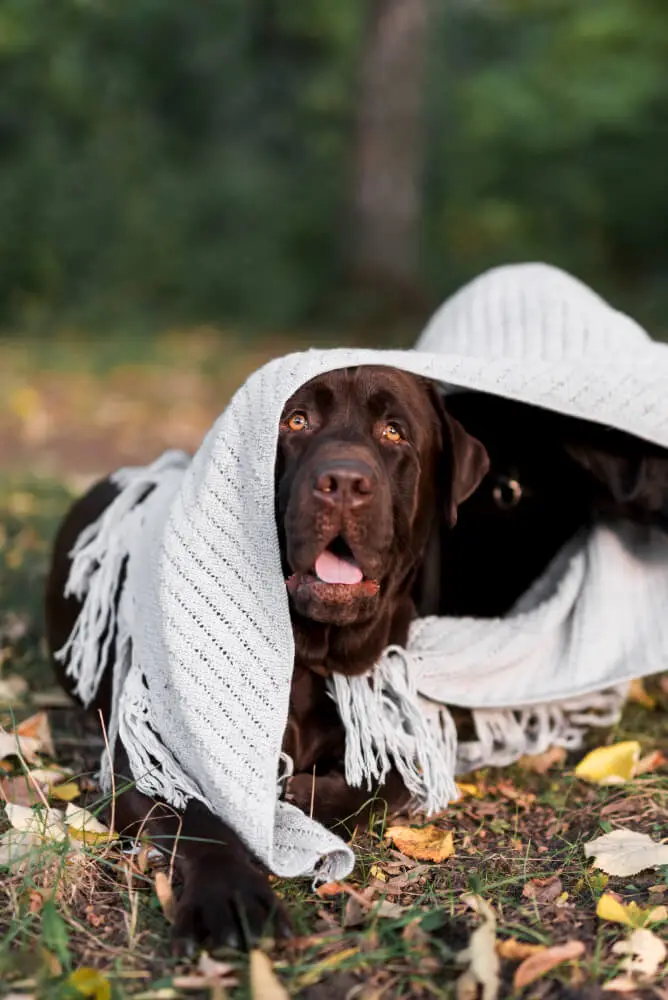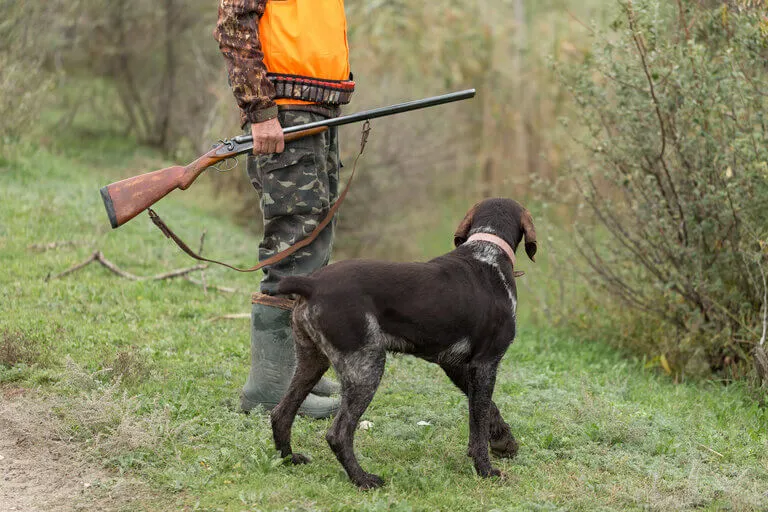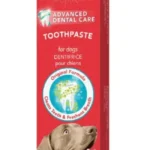Hunting dogs have a sportsperson’s fire, requiring tailored nutrition to fuel their active lifestyle and sharpen their instincts. Their diet significantly impacts their energy levels and performance. This makes choosing the best dog food for hunting dogs an important decision for handlers and owners.
Optimal health and peak performance depend on a delicate balance of high protein, healthy fats, and other vital nutrients. These should be modified according to breed and daily activity. Keep reading as we expose the key ingredients to turn your hunting companion into a field performer.
What are The Nutritional Needs of a Hunting Dog?
When considering options for what is the best dog food for hunting dogs, the key is to focus on fulfilling their robust energy demands. These canine athletes require high-caloric fuel to maintain their stamina throughout long days in the field. A premium, energy-dense diet ensures they have the stamina needed for tracking, pointing, and retrieving.
- Energy Demands
Active hunting breeds burn tremendous amounts of energy. They need diets rich in calories that serve as their energy source. Complex carbohydrates in their food can also provide sustained energy release, which is crucial for extended periods of activity.
- Essential Nutrients
Protein is fundamental for muscle repair and growth, while fats are vital for long-lasting energy. Although less than protein and fat, carbohydrates provide quick energy and should come from whole-grain sources. Vitamins and minerals support overall health, enhancing immunity and organ function, which is essential for a dog’s longevity and well-being.
- Breed-Specific Considerations
Different hunting breeds have unique dietary needs. For example, pointers require food supporting endurance, while retrievers benefit from a diet aiding recovery after rigorous swimming sessions. Consider your dog’s specific energy output and adjust their food intake accordingly.
Understanding and catering to your hunting dog’s nutritional needs is necessary for their well-being and prowess.
Discover the Powerhouse Ingredients for a Hunting Dog’s Performance
Understanding the crucial ingredients within their diet is key for those seeking the best fuel for their hunting companions. Here, we explore the top components of the best dog food for hunting dogs.
Protein: The Muscle Fuel
Protein should be the cornerstone of a hunting dog’s diet. It is the building block for muscle development and repair. Look for foods that list real meat—like chicken, beef, or fish—as the primary source. A healthy adult hunting dog generally requires proteins to make up about 30% of their diet. However, working dogs engaged in intense physical activities may need up to 35% to ensure optimal muscle recovery and maintenance.
Fats: The Endurance Enhancer
They provide a concentrated source of energy that can keep your dog active throughout the day. They offer more than twice the energy of proteins and carbohydrates and are also necessary for absorbing certain vitamins. Foods with omega-3 and omega-6 fatty acids, such as those found in fish oils, are ideal for promoting healthy coats and reducing inflammation. Depending on their activity level, hunting dogs may need fat to compose 20% to 25% of their diet.
Carbohydrates: The Digestive Supporter
Although less important than proteins and fats, they supply quick energy and aid digestive health. Good quality dog food will include complex carbohydrates like whole grains, fruits, and vegetables that provide vitamins, minerals, and fiber. This ensures a steady supply of energy and aids in healthy digestion. Hunting dogs don’t need excessive carbohydrates; about 25% to 30% of their diet should come from carbohydrate sources. It’s vital to source these carbs from high-quality, whole-food ingredients for optimal health and energy levels.
In each ingredient category, it’s paramount to ensure the quality and digestibility of the food. With their high demand for energy and nutrients, hunting dogs will greatly benefit from a diet that is not only energy-dense but also made from wholesome, natural ingredients.
How to Interpret Dog Food Labels
When interpreting dog food labels, your eyes should check the ingredient list first. The ingredients are usually listed in descending order by weight. Thus, the initial items carry more weight in the mix. For robust health, the first ingredient should ideally be a high-quality protein source, like deboned chicken or salmon. Watch out for generic terms like “meat meal,” which can mask lower-quality protein sources.
Beware of fillers – these ingredients add bulk but little nutritional value. Common fillers, including corn, wheat, and soy, aren’t inherently bad but often signal a cheaper product with less protein. Instead, look for whole vegetables, fruits, and whole grains, which offer more nutrition.
Moreover, the guaranteed analysis on the label reveals the minimum percentages of protein and fat and the maximum percentages of fiber and moisture. Assuming the label lists “chicken, barley, oats, pea protein, carrots” as the first five ingredients, and the guaranteed analysis shows 26% protein and 16% fat, this suggests a food rich in high-quality, digestible ingredients with suitable energy content for your hunting companion.
A dog food label that reads “corn, meat and bone meal, beef fat preserved with tocopherols, corn gluten meal, soybean meal” as the top five ingredients. This label’s guaranteed analysis might show 20% protein and 12% fat, which seems sufficient. However, the prominence of corn and other fillers indicates a lower-quality food likely to contain less digestible proteins and less energy density necessary for a hunting dog’s performance.
The difference is clear compared to the high-quality ingredients listed previously; such filler-laden food does not support an active hunting dog’s high-energy and nutrient-dense requirements. Remember to use this knowledge as a compass to navigate the vast sea of dog food choices, ensuring your trusted hunting sidekick gets the premium fuel they deserve to thrive in the wild.

What To Choose for Optimal Nutrition
Choosing the best dog food for hunting dogs requires finding the perfect balance of nutrients for high-performance energy. You should go for:
1. High-Energy Formulas: Peak Performance Guarantee
When it comes to high-energy formulas, popular brands such as Purina Pro Plan Sport deliver recipes rich in proteins and fats that cater to the rigorous demands of a hunting dog’s lifestyle. These diets are crafted to optimize endurance and stamina, with real meat like chicken or salmon headlining the ingredient list.
Brands like Taste of the Wild Prey and Orijen Six Fish also fit this category. They offer grain-free options teeming with premium animal proteins. Also, they have a hearty fat content to sustain energy levels through long excursions.
2. Grain-Free Choices: Gentle on the Tummy
Grain-free alternatives pave the path for comfort without compromising for pups with a sensitive digestive system. Nature’s Variety Instinct Raw Boost merges high-protein kibble with freeze-dried raw pieces, capitalizing on digestibility and taste. Similarly, Merrick Backcountry Grain-Free provides a wholesome blend of dehydrated raw meat and vegetables. Thus ensuring that sensitive stomachs are soothed and energy reserves are stocked.
Grain Vs. Grain-Free Dog Food
Now, the debate between grain-free and grain-inclusive diets is pivotal. Grains can offer sustained energy release and digestive benefits derived from high-quality sources like whole oats and barley.
However, grain-free diets avoid potential allergens and may align better with the eating patterns of dogs. Always consult with your veterinarian when making a switch, as the key is to observe how your dog responds and what truly makes them thrive—after all, that’s what makes the best hunting dog: optimal health for peak hunting performance.
3. Toppers & Homemade Infusions: Enhanced Feeding
Elevate your hunting dog’s diet by introducing supplemental options like toppers or custom homemade meals. They can inject additional energy and a pleasing variety into their meals. Some toppers contain freeze-dried raw nutrients that can enhance the flavor and nutritional value of your dog’s daily feed.
The optimal diet for your hunting dog should combine high-quality ingredients that cater to their unique energetic needs and digestive health. It’s crucial to observe your dog’s reaction to their food and adjust as necessary to maintain their vigor and well-being for the many adventures.
Exploring Homemade and Raw Diets
Would you consider a homemade or raw diet in your search for the best dog food for hunting dogs? The conversation around homemade and raw diets for hunting dogs is heating up among pet health professionals. Arguments hold that such diets mimic what dogs feast on in the wild, with evidence suggesting increased vitality and energy levels.
There isn’t a substantial stack of scientific studies to fully endorse raw feeding. However, a 2018 survey by the American Pet Products Association found that raw and fresh home-cooked diets are on the rise among pet owners seeking to provide high-quality nutrition. This growing trend points to a collective belief in the potential benefits of these diets.
Homemade and raw diets can pack a powerful nutritional punch. Yet, the success of such diets is often contingent on a delicate balance of proteins, fats, vitamins, and minerals to maintain health and vitality. It’s vital to work with a veterinarian or a canine nutritionist to craft a diet that meets a dog’s specific needs, especially for the tireless hunting dog that requires ample energy reserves.
Feeding Tips for Peak Performance:
- Pre-hunt Meals: The best hunting dogs start their day with a hearty, easily digestible breakfast, ensuring they have the fuel for the strenuous activity ahead without burdening their digestive system.
- Hydration Essentials: Always ensure your hunting partner stays well-hydrated, particularly during active hunts, as dehydration can swiftly diminish performance.
- Recovery Rituals: Post-hunt meals are crucial for recovery; they should include high-quality protein for muscle repair and be augmented with joint supplements to counteract the stress of a vigorous day.
Pros and Cons of Raw Feeding
The raw feeding movement has gathered momentum among hunting dog enthusiasts who swear by its natural approach to canine nutrition. Yet, this method is not without its controversies and considerations. In weighing the pros and cons of raw feeding for your hunting dog, it’s important to approach the topic with an informed perspective toward safety and balance.
Pros
One of the most talked-about advantages of a raw diet is the boost in energy and vitality that owners might notice in their hunting dogs. This isn’t just about having more spring in their step; it’s about ensuring these dogs can sustain long periods of intense physical activity without losing steam. Raw diets are considered to be more easily digested by some dogs too, which means their bodies can absorb nutrients more efficiently, translating into better performance out in the field.
Cons
However, while raw diets might seem less processed and closer to a dog’s natural diet, they come with real risks. Bacterial contamination is not a hypothetical threat – it can be a tangible danger to both dogs and their human families. Safety has to be paramount, which means meticulous handling and storage practices are non-negotiable.
Another pressing concern is the challenge of getting the nutritional balance just right. Dogs, like humans, need a well-rounded diet to thrive, and achieving this with a raw diet requires knowledge and precision. It’s not as simple as throwing together some meat, bones, and veggies. Without proper planning, dogs might end up with dietary deficiencies which can lead to long-term health issues.
Takeaway
So while the raw and homemade diet camps advocate for the significant perks, it’s clear that these benefits only manifest if handled with caution, expertise, and a thorough understanding of a dog’s nutritional needs. For those considering this path, it is not a journey to embark on lightly. It should ideally be navigated with veterinary guidance to secure the well-being of your loyal hunting companion.
Transitioning to a Raw Diet; Feeding Frequency and Timing
Transitioning to raw feeding should happen gradually. Mix raw food with the current diet, slowly increasing the raw proportion. Observe the dog’s reaction and adjust as needed. For adult hunting dogs, two meals a day is typical, timed to optimize energy levels for activity. A morning meal fuels the day’s pursuits, and an evening meal supports recovery.
Whether adopting a homemade or raw diet approach, the key lies in meticulous planning and a watchful eye on your hunting dog’s health responses. Remember to consult with professionals to navigate this complex nutritional journey, ensuring what’s in the bowl translates to peak performance in the field.
The Role of Supplements and Food Additives
When talking about achieving the best performance in hunting dogs, it’s essential to discuss the role of supplements and food additives. Besides finding the best dog food for hunting dogs, you might consider adding supplements and food additives.
As these dogs spend long hours in various outdoor conditions, supplements can be crucial in filling nutritional gaps. Joint supplements are especially important for hunting dogs because they often engage in high-impact activities.
Supplements containing chondroitin, glucosamine, and methylsulfonylmethane (MSM) are highly beneficial. This study shows glucosamine aids in the repair of damaged cartilage and reduces inflammation, thus supporting joint health.
In addition to joint health, omega fatty acids are vital for a hunting dog’s coat and skin health. Omega-3 and omega-6 fatty acids help maintain the skin’s protective barrier, reduce inflammatory skin responses, and support a shiny and healthy coat. Considering the rugged terrain and environmental exposures hunting dogs face, a robust coat and skin are their first line of defense.
Nordic Naturals Omega-3 Pet
This is a great supplement for hunting dogs made from sustainably sourced fish oil. It’s rich in EPA and DHA, types of omega-3 fatty acids that are known for supporting skin health, immune system function, and overall vitality. Furthermore, clinical research corroborates that these essential fatty acids can enhance coat quality and reduce itchiness associated with skin conditions.
Incorporating the right supplements and food additives into your hunting dog’s diet can play a pivotal role in their performance and well-being. Using premium, research-supported products ensures these active dogs get the support they need to excel in the field and at home. Always seek guidance from a veterinarian before starting any new supplement. Consulting guarantees safety and appropriateness for your dog’s specific health situation.
Special Dietary Considerations and Managing Allergies
Individualizing attention to diet is essential for hunting dogs with dietary restrictions or allergies. It begins with identifying the allergen through an elimination diet. Elimination removes suspect ingredients until symptoms dissipate. Once you determine what is causing your dog’s allergies, you can find allergy-conscious diets to avoid these triggers. You can also consider natural alternatives to Apoquel.
Dogs with allergies may benefit from hydrolyzed protein diets. Since the proteins are broken down into small fragments, the immune system does not recognize them as allergens. Moreover, incorporating natural anti-inflammatory ingredients like fish oil, rich in omega fatty acids, can soothe skin irritations associated with allergies.
Owners must read labels carefully and opt for limited-ingredient diets or hypoallergenic dog food formulas. Treating a dog with allergies is not just about what’s inside their bowl but also consistency in avoiding treats or table scraps that could contain allergens. Consulting with a veterinarian or veterinary nutritionist is crucial in tailoring a diet that manages allergies without compromising on the necessary nutrients vital for a hunting dog’s active lifestyle.
Bottom Line
The nutritional program of hunting dogs is a balance of energy-dense, digestible meals, adequate hydration, and post-activity recovery nutrition. While raw diets may offer increased vitality and natural eating experiences, they require careful handling to avoid contamination and nutritional imbalances.
Supplements like glucosamine for joints and omega fatty acids for skin and coat health protect and enhance a hunting dog’s well-being. Specialized hypoallergenic diets and vet consultations are necessary for allergy-prone dogs to maintain peak performance while managing sensitivities. What is the best dog food for hunting dogs according to you?





